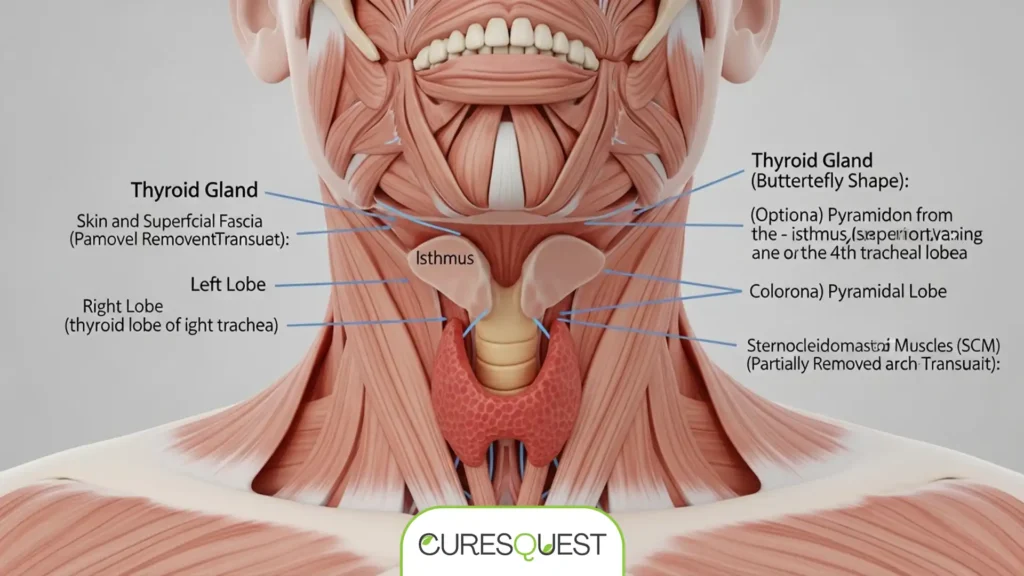The thyroid gland, a small butterfly-shaped organ located at the base of your neck, plays an outsized role in your overall health. It produces hormones that regulate metabolism, energy levels, body temperature, heart rate, and even mood. When this vital gland is out of balance, it can lead to a cascade of disruptive symptoms, impacting nearly every aspect of your well-being. Millions worldwide grapple with thyroid conditions, from the sluggishness of hypothyroidism to the hyperactivity of hyperthyroidism, often seeking effective and sustainable solutions. While conventional medicine offers crucial treatments, a growing number of individuals are exploring a more holistic and natural way to treat thyroid imbalances, focusing on lifestyle, diet, and complementary therapies.
This comprehensive guide delves into the intricate world of thyroid health, offering insights into how natural approaches can support your gland’s function, alleviate symptoms, and promote long-term wellness. We’ll explore evidence-based strategies encompassing nutrition, stress management, detoxification, and targeted supplementation, empowering you to take a proactive role in your health journey. Understanding the root causes of thyroid dysfunction is the first step towards finding a natural way to treat thyroid conditions, moving beyond symptom management to foster genuine healing and vitality.
Table of Contents
Understanding Your Thyroid: The Master Gland of Metabolism
Before diving into natural treatments, it’s essential to grasp the fundamental role of the thyroid. This endocrine gland produces two primary hormones: thyroxine (T4) and triiodothyronine (T3). T4 is the inactive form, which is then converted into the active T3, primarily in the liver and gut. These hormones are responsible for regulating your body’s metabolic rate, influencing how quickly your body uses energy, makes proteins, and controls how sensitive your body is to other hormones. Think of your thyroid as the thermostat for your entire body – when it’s off, everything else can feel off too.
The thyroid’s function is controlled by the pituitary gland, which produces Thyroid-Stimulating Hormone (TSH). When thyroid hormone levels are low, the pituitary releases more TSH to stimulate the thyroid; when levels are high, TSH production decreases. This delicate feedback loop can be disrupted by numerous factors, leading to the common thyroid imbalances we see today. Understanding the intricate workings of the endocrine system is crucial for anyone seeking a natural way to treat thyroid issues.

Common Thyroid Conditions: Hypothyroidism vs. Hyperthyroidism
Thyroid disorders broadly fall into two categories: underactivity (hypothyroidism) and overactivity (hyperthyroidism). While their symptoms often appear to be opposites, both can significantly impair quality of life.
Hypothyroidism: The Slowdown
Hypothyroidism occurs when the thyroid gland doesn’t produce enough hormones. The most common cause in developed countries is Hashimoto’s thyroiditis, an autoimmune condition where the body’s immune system attacks the thyroid. Symptoms can develop slowly and include:
- Fatigue and sluggishness
- Weight gain and difficulty losing weight
- Increased sensitivity to cold
- Constipation
- Dry skin and hair, hair loss
- Muscle aches, tenderness, and stiffness
- Pain, stiffness, or swelling in your joints
- Heavy or irregular menstrual periods
- Impaired memory, “brain fog”
- Depression
Identifying these symptoms is key to exploring a natural way to treat thyroid conditions, particularly hypothyroidism, which often responds well to holistic interventions alongside conventional care.
Hyperthyroidism: The Speedup
Hyperthyroidism, on the other hand, is characterized by an overproduction of thyroid hormones. Graves’ disease, another autoimmune condition, is the most common cause. Symptoms often include:
- Unexplained weight loss
- Rapid or irregular heartbeat (palpitations)
- Nervousness, anxiety, and irritability
- Tremor in your hands and fingers
- Increased sweating
- Changes in menstrual patterns
- Increased sensitivity to heat
- Changes in bowel patterns, including more frequent bowel movements
- Enlarged thyroid gland (goiter)
- Fatigue and muscle weakness
- Sleep problems
While often requiring medical intervention, natural strategies can complement conventional treatments for hyperthyroidism, helping to manage symptoms and support overall health.

The Holistic Approach: Finding a Natural Way to Treat Thyroid Imbalances
A holistic approach to thyroid health recognizes that the body is an interconnected system. Instead of merely treating symptoms, it seeks to identify and address the underlying root causes of dysfunction. This often involves looking at diet, lifestyle, environmental exposures, stress levels, and gut health. For those seeking a natural way to treat thyroid issues, this comprehensive perspective is invaluable.
1. Dietary Interventions: Fueling Your Thyroid
Nutrition plays a foundational role in thyroid function. What you eat (and don’t eat) can directly impact hormone production, conversion, and immune system regulation. A thyroid-friendly diet is often rich in whole, unprocessed foods and specific nutrients.
Key Nutrients for Thyroid Health:
- Iodine: Essential for producing thyroid hormones (T4 and T3). However, both deficiency and excess can be problematic. Sources include seaweed (kelp, nori), cod, shrimp, dairy, and iodized salt. It’s crucial to get the right balance, as too much iodine can exacerbate autoimmune thyroid conditions.
- Selenium: A powerful antioxidant vital for the conversion of T4 to T3 and protecting the thyroid from oxidative damage. Brazil nuts are an excellent source; just 2-3 nuts provide your daily requirement. Other sources include tuna, sardines, eggs, and legumes.
- Zinc: Necessary for TSH production and the conversion of T4 to T3. Zinc deficiency can lead to hypothyroidism. Good sources include oysters, beef, chicken, pumpkin seeds, and legumes.
- B Vitamins: Especially B12, often deficient in hypothyroid patients, and B6. Found in meat, fish, eggs, dairy, leafy greens, and legumes. Dive deeper into the benefits of essential vitamins.
- Vitamin D: Many thyroid patients, especially those with autoimmune conditions, are deficient in Vitamin D. It plays a critical role in immune modulation. Sunlight exposure, fatty fish, and fortified foods are sources.
- Omega-3 Fatty Acids: Help reduce inflammation, which is often a factor in autoimmune thyroid conditions. Found in fatty fish (salmon, mackerel, sardines), flaxseeds, chia seeds, and walnuts.
Foods to Avoid or Limit:
- Goitrogens (Raw): Certain foods like raw broccoli, cauliflower, cabbage, and kale contain goitrogens, which can interfere with thyroid hormone production. Cooking them often deactivates these compounds. Moderate consumption of cooked goitrogenic vegetables is generally fine, especially if iodine intake is adequate.
- Processed Foods & Sugar: These contribute to inflammation and can disrupt gut health, both of which negatively impact thyroid function.
- Gluten: For individuals with Hashimoto’s, gluten can trigger an autoimmune response due to molecular mimicry (where gluten proteins resemble thyroid proteins). A gluten-free diet often improves symptoms.
- Dairy: Similar to gluten, some individuals with autoimmune conditions find relief by avoiding dairy, as it can be inflammatory.
- Soy: Can interfere with thyroid hormone absorption and function, especially if iodine intake is insufficient.
Adopting a nutrient-dense, anti-inflammatory diet is a cornerstone of a natural way to treat thyroid imbalances.

2. Lifestyle Modifications: Supporting Your System
Beyond diet, daily habits significantly influence thyroid health. Addressing these areas can provide powerful support for your endocrine system.
Stress Management: The Silent Thyroid Saboteur
Chronic stress can wreak havoc on your adrenal glands, which in turn affect thyroid function. The stress hormone cortisol can suppress TSH production and inhibit the conversion of T4 to T3. Incorporating stress management techniques is vital:
- Mindfulness and Meditation: Regular practice can significantly lower stress levels.
- Yoga and Tai Chi: Combine physical movement with breathwork and mental focus.
- Deep Breathing Exercises: Simple yet effective ways to calm the nervous system.
- Adequate Downtime: Prioritize relaxation and hobbies.
Learning to manage stress is a powerful natural way to treat thyroid dysfunction by supporting the entire HPA axis (hypothalamic-pituitary-adrenal axis).
Sleep Optimization: Rest for Restoration
Poor sleep can disrupt hormone balance, including thyroid hormones. Aim for 7-9 hours of quality sleep per night. Establish a consistent sleep schedule, create a dark and quiet sleep environment, and avoid screens before bed.
Regular Exercise: Move for Metabolism
Moderate, consistent exercise supports metabolism, reduces stress, and improves overall well-being. Avoid overtraining, especially if you have hypothyroidism, as it can further tax your system. Focus on a mix of cardio, strength training, and flexibility exercises.
Minimizing Environmental Toxins: A Cleaner You
Exposure to environmental toxins (endocrine disruptors) found in plastics, pesticides, and personal care products can interfere with thyroid function. Choose organic foods, filter your water, use natural cleaning products, and opt for non-toxic personal care items to support your body’s natural detoxification pathways. This is a crucial, yet often overlooked, natural way to treat thyroid issues.

3. Herbal Remedies and Supplements: Targeted Support
While diet and lifestyle are primary, certain herbs and supplements can offer targeted support. Always consult a healthcare professional before starting any new supplement, especially if you are on thyroid medication.
Adaptogens: Balancing Your Stress Response
- Ashwagandha (Withania somnifera): An Ayurvedic herb known for its adaptogenic properties, helping the body manage stress. Some studies suggest it can improve thyroid function in subclinical hypothyroid patients.
- Rhodiola Rosea: Another adaptogen that can enhance energy, reduce fatigue, and improve mental focus, particularly beneficial for those experiencing thyroid-related sluggishness.
Specific Herbs for Thyroid Health:
- Bladderwrack (Fucus vesiculosus): A type of seaweed rich in iodine. It has traditionally been used for hypothyroidism, but caution is advised due to the risk of excessive iodine intake, which can worsen autoimmune conditions.
- Guggul (Commiphora mukul): Used in Ayurvedic medicine, guggul may support thyroid function and aid in cholesterol management, a common concern for hypothyroid individuals.
Gut Health Supplements: The Gut-Thyroid Axis
Emerging research highlights that gut health plays a pivotal role in thyroid function. An imbalance in gut bacteria (dysbiosis) can contribute to inflammation and autoimmune responses. Probiotics and prebiotics can help restore a healthy gut microbiome, supporting overall immune and thyroid health. Consider a high-quality probiotic supplement and incorporate fermented foods into your diet.
Here’s a summary of key nutrients and their roles:
| Nutrient | Primary Role in Thyroid Health | Good Dietary Sources | Considerations |
|---|---|---|---|
| Iodine | Essential for T3 and T4 hormone synthesis. | Seaweed, iodized salt, cod, shrimp, dairy. | Both deficiency and excess can impair function; use with caution. |
| Selenium | Antioxidant, aids T4 to T3 conversion, protects thyroid. | Brazil nuts, tuna, sardines, eggs, legumes. | Crucial for autoimmune thyroid conditions. |
| Zinc | Supports TSH production and T4 to T3 conversion. | Oysters, beef, pumpkin seeds, legumes. | Deficiency can lead to low thyroid hormones. |
| Vitamin D | Immune modulation, reduces inflammation. | Sunlight, fatty fish, fortified foods. | Commonly deficient in thyroid patients. |
| B Vitamins | Energy production, nerve function, hormone regulation. | Meat, fish, eggs, leafy greens, legumes. | B12 deficiency common in hypothyroidism. |
| Omega-3s | Reduces inflammation, supports cellular health. | Fatty fish, flaxseeds, chia seeds, walnuts. | Beneficial for autoimmune conditions. |

4. Complementary Therapies: Enhancing Well-being
Beyond direct interventions, several complementary therapies can support overall well-being and indirectly benefit thyroid health by reducing stress and promoting balance.
- Acupuncture: Traditional Chinese Medicine (TCM) practices, including acupuncture, aim to balance the body’s energy (Qi). Some studies suggest it can help manage symptoms associated with thyroid conditions and improve quality of life.
- Yoga and Meditation: As mentioned under stress management, these practices are excellent for calming the nervous system, reducing inflammation, and promoting hormonal balance.
- Massage Therapy: Can help reduce muscle tension, improve circulation, and promote relaxation, all of which contribute to overall well-being and stress reduction.
Frequently Asked Questions About Natural Thyroid Treatment
Navigating thyroid health can bring many questions. Here are some frequently asked questions about finding a natural way to treat thyroid conditions:
Can I completely treat my thyroid condition naturally without medication?
For many, especially those with diagnosed hypothyroidism or hyperthyroidism, medication is a crucial part of managing the condition and preventing severe complications. Natural approaches are best viewed as complementary strategies to support overall health, reduce symptoms, and potentially reduce the need for higher doses of medication over time, always under medical supervision. It is rarely advisable to stop prescribed medication without consulting your doctor.
How long does it take to see results from natural thyroid treatments?
The timeline for seeing results can vary greatly depending on the individual, the severity of the condition, and the consistency of natural interventions. Some people may notice improvements in energy, mood, and digestion within a few weeks, while others might take several months to experience significant changes. Patience and persistence are key.
Are there any risks associated with natural thyroid remedies?
Yes, even natural remedies can have risks. For example, excessive iodine intake from supplements or certain seaweeds can worsen autoimmune thyroid conditions. Some herbs can interact with medications or have side effects. It is absolutely essential to consult with a qualified healthcare provider (doctor, endocrinologist, or functional medicine practitioner) before starting any new natural treatment, especially if you are already on medication.
Is a gluten-free diet necessary for everyone with thyroid issues?
A gluten-free diet is particularly beneficial for individuals with Hashimoto’s thyroiditis, an autoimmune condition, due to the potential for molecular mimicry. While not universally necessary, many people with thyroid issues report feeling better on a gluten-free or reduced-gluten diet. It’s an area worth exploring under guidance, especially if digestive symptoms are present.
How important is gut health for thyroid function?
Extremely important! The gut-thyroid axis is a significant area of research. A healthy gut microbiome is crucial for the conversion of T4 to T3, nutrient absorption, and immune system regulation. Dysbiosis (imbalance of gut bacteria) can contribute to inflammation and autoimmune responses, directly impacting thyroid health. Supporting gut health through diet and probiotics is a key natural way to treat thyroid imbalances.
Can stress really impact my thyroid?
Absolutely. Chronic stress elevates cortisol levels, which can suppress TSH production and inhibit the conversion of T4 to T3. This can exacerbate hypothyroid symptoms or even trigger thyroid dysfunction in susceptible individuals. Effective stress management is a critical component of any natural thyroid treatment plan.
What is the single most important natural step I can take?
While there isn’t a single “most important” step, focusing on a nutrient-dense, whole-foods diet that eliminates inflammatory triggers (like processed foods, excessive sugar, and potential food sensitivities) provides a strong foundation. This dietary shift often has a ripple effect, improving gut health, energy levels, and overall well-being, paving the way for other natural interventions to be more effective.
Conclusion: Empowering Your Thyroid Health Journey
Embarking on a journey to find a natural way to treat thyroid imbalances is a profound commitment to your overall health and well-being. By embracing a holistic perspective that integrates nutrient-rich diets, mindful lifestyle adjustments, targeted supplementation, and stress management, you can significantly support your thyroid gland and alleviate many debilitating symptoms. Remember, while natural approaches offer incredible potential, they are most effective when pursued in conjunction with professional medical guidance. Always consult your healthcare provider before making significant changes to your treatment plan. Taking proactive steps towards understanding and nourishing your thyroid is an empowering path to reclaiming your vitality and living a life of balanced wellness.







